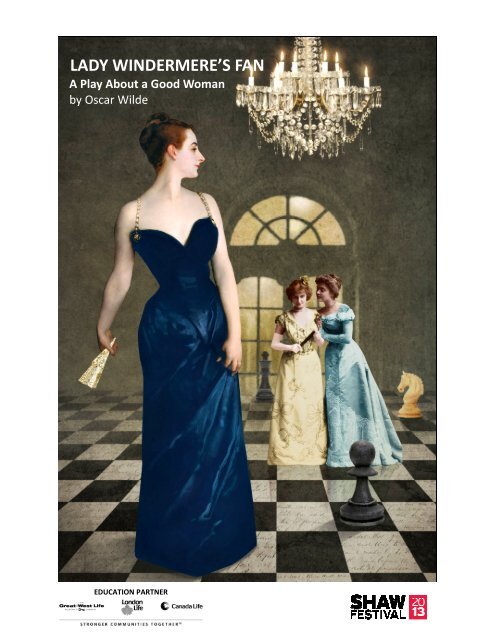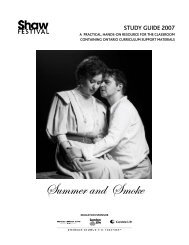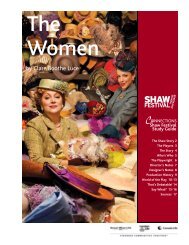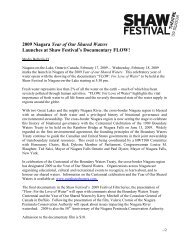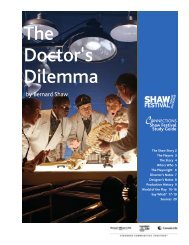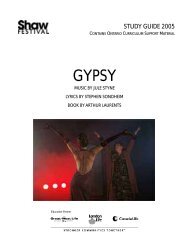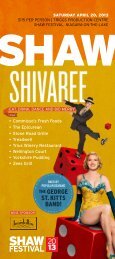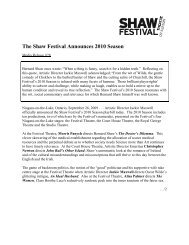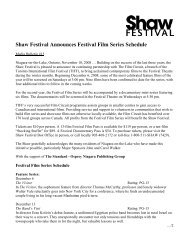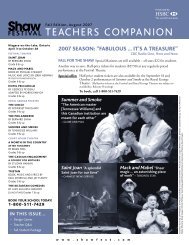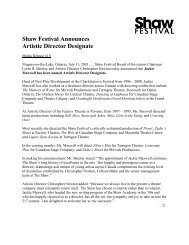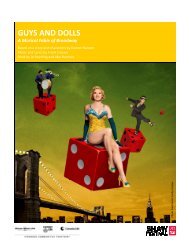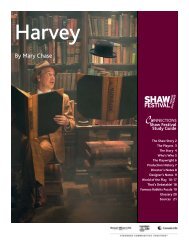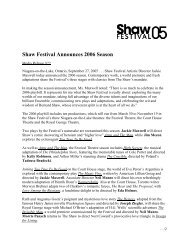the Lady Windermere's Fan study guide. - Shaw Festival Theatre
the Lady Windermere's Fan study guide. - Shaw Festival Theatre
the Lady Windermere's Fan study guide. - Shaw Festival Theatre
You also want an ePaper? Increase the reach of your titles
YUMPU automatically turns print PDFs into web optimized ePapers that Google loves.
LADY WINDERMERE’S FAN<br />
A Play About a Good Woman<br />
by Oscar Wilde<br />
EDUCATION PARTNER
<strong>Shaw</strong> <strong>Festival</strong><br />
2<br />
At <strong>the</strong> SHAW FESTIVAL THEATRE, we celebrate <strong>the</strong> work of an incredibly gifted playwright<br />
named GEORGE BERNARD SHAW (he shall henceforth be referred to as Bernard <strong>Shaw</strong>, as that<br />
was his preference).<br />
If BERNARD SHAW was anything, he was a RADICAL REBEL WITH A<br />
CAUSE. At <strong>the</strong> <strong>Shaw</strong> <strong>Festival</strong>, we celebrate <strong>the</strong> work of this and o<strong>the</strong>r<br />
rabble-rousers.<br />
<strong>Shaw</strong> wrote to educate people about social and political issues and to<br />
inspire people to DO SOMETHING about injustice and passivity about<br />
<strong>the</strong>ir circumstances. He took great pleasure in ruffling <strong>the</strong> fea<strong>the</strong>rs of<br />
<strong>the</strong> establishment and getting people to think about social and political<br />
issues.<br />
That makes him COOL.<br />
BERNARD<br />
SHAW<br />
Because we celebrate that, <strong>the</strong> SHAW FESTIVAL is also, de facto, COOL.<br />
He was a subversive provocateur, and by extension, we are too!<br />
<strong>Shaw</strong> said “… a civilization<br />
can not progress without<br />
criticism.”<br />
He wrote and educated<br />
people about <strong>the</strong> injustices<br />
he saw in society.<br />
Sometimes injustice takes<br />
place because nobody knows<br />
about it. Sometimes injustice<br />
persists because people don’t<br />
know what to do about it.<br />
Are you aware of some kind<br />
of injustice in your life or in<br />
<strong>the</strong> world around you? If you<br />
had unlimited power to fix<br />
any unjust situation, what<br />
would you do?<br />
<strong>Theatre</strong> can change <strong>the</strong> world...<br />
<strong>Theatre</strong> can change people who<br />
can change <strong>the</strong> world.<br />
-Jackie Maxwell,<br />
Artistic Director<br />
WHAT WOULD YOU DO?<br />
I WOULD_________________________<br />
_________________________________<br />
_________________________________<br />
2
Synopsis<br />
3<br />
“I suppose society is wonderfully delightful. To be in it is merely<br />
a bore. But to be out of it is simply a tragedy.”<br />
<strong>Lady</strong> Windermere’s <strong>Fan</strong> is a comedy of manners* by Oscar Wilde. We meet <strong>the</strong> typical Wilde<br />
set -men and women of class and titles who are more concerned about charm and social<br />
graces than <strong>the</strong>y are <strong>the</strong> world around <strong>the</strong>m. Their world is one of propriety and elegance,<br />
attractiveness and, most importantly, surfaces; but beneath <strong>the</strong> glamour of high status and<br />
class lurks a dark truth about human relationships, gender double-standards in <strong>the</strong> Victorian<br />
era, and social alienation.<br />
<strong>Lady</strong> Windermere, a young woman who has recently married into <strong>the</strong> upper class, is making<br />
preparations for her birthday party. Her husband, to her consternation, insists that she extend<br />
an invitation to one Mrs Erlynne. But <strong>the</strong> <strong>Lady</strong> has just recently become privy to gossip about<br />
her husband’s strange relationship with this woman of ill-repute, and she refuses to reach out<br />
to her. Lord Windermere protests and invites Mrs Erlynne anyway.<br />
“Scandal is gossip made tedious by morality.”<br />
Gossip abounds at <strong>Lady</strong> Windermere’s party about <strong>the</strong> suspicious Mrs Erlynne. <strong>Lady</strong><br />
Windermere’s concern grows: can her husband and this woman truly be having an affair? She<br />
is still madly in love with Lord Windermere, and what’s more, <strong>the</strong>y have a young son.<br />
Devastated at <strong>the</strong> possibility, she considers a proposal from Lord Darlington, who loves her<br />
deeply and passionately. To say yes to Darlington offers <strong>the</strong> promise of an escape from what<br />
may very well be a doomed marriage. Then again, this new romance may too fade, and leave<br />
her, so to speak, in <strong>the</strong> gutter.<br />
As Wilde observes, class in <strong>the</strong> Victorian era is <strong>the</strong> most important thing, and to uphold appearances<br />
and propriety is law. The threat of social expulsion is a recurrent <strong>the</strong>me in much of<br />
Wilde’s work. Characters are obsessed with status and graces and are cautious not to step outside<br />
of established social boundaries.<br />
Coincidentally (or, perhaps ironically) this foreshadows Wilde’s own troubles later in his career,<br />
when he was put on trial in <strong>the</strong> wake of his relationship with Lord Alfred Douglas. Not<br />
even <strong>the</strong> author was exempt from this rule, and Wilde never fully recovered. As one character<br />
explains, “We are all in <strong>the</strong> gutter, but some of us are looking at <strong>the</strong> stars.”<br />
*Comedy of manners: a comedy that satirizes behavior of a particular social group, especially<br />
<strong>the</strong> upper classes.<br />
3
About <strong>the</strong> Playwright<br />
4<br />
OSCAR WILDE<br />
<strong>Lady</strong> Windermere’s <strong>Fan</strong> was Oscar Wilde’s first <strong>the</strong>atrical hit, but he made himself famous well<br />
before he created any notable work of art by actually being a work of art. Before he graduated<br />
from Oxford, Wilde had turned himself into a living example of something called <strong>the</strong> Aes<strong>the</strong>tic<br />
Movement. It was an ideology that believed that art should not seek to convey a moral, sentimental<br />
or educational message but should give sensual pleasure. The aim was “to exist beautifully”:<br />
Art for Art’s sake.<br />
Wilde grew his hair long, dressed in outlandish clo<strong>the</strong>s and wore a fake green carnation in his<br />
lapel. He became what is known as a Dandy; a cynical, witty, flamboyant, and well-dressed<br />
man. He was a hit at dinner parties and a celebrity before he ever really created anything. So<br />
much so, that when Gilbert and Sullivan’s Patience, a satirical opera on British dandies and <strong>the</strong><br />
aes<strong>the</strong>tic movement, was preparing for a run on Broadway, <strong>the</strong> producers recruited Wilde to<br />
do a lecture tour of <strong>the</strong> United States. Basically, dandies didn’t exist in <strong>the</strong> U.S., so Wilde was<br />
sent ahead of <strong>the</strong> opera to talk about aes<strong>the</strong>tics across America, with <strong>the</strong> idea that when <strong>the</strong><br />
show did hit Broadway, its audience would know exactly who it was making fun of. But, instead<br />
of making fun of him, <strong>the</strong> American public loved him. In a letter home he wrote “Great<br />
success here. Nothing like it since Dickens <strong>the</strong>y tell me.”<br />
By <strong>the</strong> time he returned to London, Wilde was ready to start practicing what he preached. He<br />
wrote a book of poetry, moved on to some literary essays, and <strong>the</strong>n wrote <strong>the</strong> novel The<br />
Picture of Dorian Grey, which was heavily criticized for its decadence and homosexual<br />
allusions. The Daily Chronicle called it “poisonous,” and “heavy with mephitic odours of moral<br />
and spiritual putrefaction.” Though nowadays, many consider this to be Wilde’s greatest work.<br />
It wasn’t until <strong>the</strong> play <strong>Lady</strong> Windermere’s <strong>Fan</strong> that Wilde received <strong>the</strong> artistic acclaim he’d<br />
been seeking. After that, Wilde rapidly followed <strong>the</strong> next three years with a series of o<strong>the</strong>r hit<br />
plays climaxing with The Importance of Being Earnest.<br />
Many of Wilde’s plays are about <strong>the</strong> consequences of being forced out of society through<br />
scandal. This recurring <strong>the</strong>me foreshadowed Wilde’s own impending fall. He had no idea that<br />
in a few short years his own life would become <strong>the</strong> scandal of <strong>the</strong> century. In 1895, at <strong>the</strong><br />
height of his fame and while The Importance of Being Earnest was in its opening run, Oscar<br />
Wilde was tried, convicted and imprisoned for gross indecency. He was sentenced to two<br />
years’ hard labour for his intimate involvement with o<strong>the</strong>r men. He never saw his children<br />
again and three years after his release, he died, impoverished in a Paris hotel room. He was<br />
46 years old.<br />
Upon graduating, his Oxford classmates asked what he planned to do with his life, Wilde responded<br />
“God knows; I won’t be an Oxford don anyhow. I’ll be a poet, a writer, a dramatist,<br />
somehow or o<strong>the</strong>r, I’ll be famous, and if not famous, notorious.” As it turned out he managed<br />
to accomplish all of <strong>the</strong>se things, and oddly enough, in that order.<br />
4
Who’s Who<br />
5<br />
Lord Windermere<br />
Played by Martin Happer<br />
Regarded as <strong>the</strong> ideal<br />
husband— until people begin<br />
to question his relationship<br />
with <strong>the</strong> mysterious<br />
Mrs Erlynne.<br />
<strong>Lady</strong> Windermere<br />
Played by Marla McLean<br />
The puritanical, principled<br />
young wife of Lord<br />
Windermere. Her black and<br />
white view of <strong>the</strong> world is<br />
challenged when Mrs<br />
Erlynne, who is supposedly<br />
wicked, sacrifices her own<br />
reputation to save <strong>Lady</strong><br />
Windermere from social<br />
disgrace.<br />
Mrs Erlynne<br />
Played by Tara Rosling<br />
She is trying to find her way<br />
back into society’s favour<br />
after years of being outcast<br />
and abroad. She is<br />
regarded with suspicion by<br />
everyone but Lord<br />
Windermere. The uncertain<br />
nature of <strong>the</strong>ir relationship<br />
is causing ripples throughout<br />
society.<br />
The Duchess of Berwick<br />
Played by Corrine Koslo<br />
An aristocrat. She pays a<br />
visit to <strong>Lady</strong> Windermere on<br />
her birthday to deliver <strong>the</strong><br />
news that Lord Windermere<br />
is having an affair.<br />
Lord Darlington<br />
Played by Gray Powell<br />
In love with <strong>Lady</strong><br />
Windermere. He hints that<br />
her husband, Lord<br />
Windermere, has been<br />
unfaithful in order to gain<br />
her affection.<br />
5
The World of <strong>the</strong> Play<br />
6<br />
“...nowadays so many conceited people go about<br />
Society pretending to be good…”<br />
-Lord Darlington<br />
Womanhood<br />
The play takes place on <strong>Lady</strong> Windermere’s 21st birthday. She has already been married for two years<br />
and has a young child. <strong>Lady</strong> Agatha is merely 17 and her mo<strong>the</strong>r, <strong>the</strong> Duchess of Berwick, is trying<br />
desperately to marry her off. Womanhood arrives early in <strong>the</strong> Victorian era. There is no adolescence.<br />
These young ladies may not be much older than you!<br />
A ‘Good’ Woman<br />
The popular Victorian ideal of a good woman was depicted as someone devoted to domestic life and<br />
to her husband. She was expected to be charming, gentle, sympa<strong>the</strong>tic, self-sacrificing, pious and<br />
pure. <strong>Lady</strong> Windermere holds herself to this high ideal - that is, until she nearly runs away and<br />
abandons her family. Luckily, Mrs Erlynne intervenes.<br />
Hypocrisy<br />
Oscar Wilde satirizes <strong>the</strong> rigidity and hypocrisy of Victorian upper class morality (represented by <strong>Lady</strong><br />
Windermere) as too simplistic. People don’t typically have as much to do with goodness as <strong>the</strong>y claim<br />
to. Ironically, those who society considers to be immoral (Lord Darlington and Mrs Erlynne) are<br />
actually shown to have a tremendous capacity for goodness - perhaps more so than those who claim<br />
to have ‘high’ moral standards. It is, in fact, <strong>the</strong> society outsider, Mrs Erlynne, who sacrifices herself to<br />
save <strong>Lady</strong> Windermere from her own lapse of morality.<br />
In J.B. Priestley’s book The Edwardians, he explains <strong>the</strong> hypocrisy like this:<br />
“...society did insist upon social discipline, upon a certain level of behavior, upon appearances being<br />
kept up, no matter what went on behind locked doors. Thus one of its men, discovering that his wife<br />
had a lover, might refuse for years to speak to her in private, while still playing <strong>the</strong> devoted husband in<br />
public. Old titled families insisted upon a noblesse oblige attitude at least as far as outward<br />
appearances were concerned. These people were expected to be ‘loyal to <strong>the</strong>ir class’ which meant<br />
that <strong>the</strong>y had not to be sufficiently foolish to be found out so that all manner of dreadful envious<br />
people might jeer at <strong>the</strong>m. Hypocrisy wore <strong>the</strong> cloak of social, even political, responsibility, political<br />
because so many of <strong>the</strong>se men sat, when <strong>the</strong>y felt like it, in <strong>the</strong> House of Lords.”<br />
READ/WRITE/DISCUSS:<br />
Post-Show<br />
What do you think it means to be a ‘good woman’ in society’s eyes (<strong>the</strong>n and now)? A ‘good’ wife? A<br />
‘good’ mo<strong>the</strong>r?<br />
Has <strong>Lady</strong> Windermere set an unattainable ideal?<br />
Do you think <strong>Lady</strong> Windermere’s idea of a good woman changes over <strong>the</strong> course of <strong>the</strong> play?<br />
6
The World of <strong>the</strong> Play<br />
7<br />
The Season<br />
The ’season’ refers to <strong>the</strong> social season, an annual period (May to July) when it was customary for elite<br />
members of society to occupy <strong>the</strong>mselves with shopping, paying calls, attending concerts, sporting<br />
events, balls, parties and charity events. People who were ‘in society’ typically had country estates but<br />
moved to a townhouse in a fashionable part of London for <strong>the</strong> social season.<br />
London became a marriage market during <strong>the</strong> season. The season coincided with Parliament being in<br />
session, as many of <strong>the</strong> men were involved with meetings at <strong>the</strong> House of Lords, but <strong>the</strong> main purpose<br />
of <strong>the</strong> season was to arrange marriages. Balls and parties were held so that young men and women of<br />
suitable backgrounds could meet. The children of nobility were pronounced eligible for marriage to<br />
o<strong>the</strong>r members of <strong>the</strong>ir class. Once presented, a prospective bride would attend numerous balls and<br />
parties, and if she didn’t marry within two or three seasons, she was considered a failure, and at 30 a<br />
hopeless spinster.<br />
The women of <strong>the</strong> family put careful consideration into introducing young people with compatible<br />
interests and social standings. There was no dating - young people from respectable families did not go<br />
to places toge<strong>the</strong>r except in <strong>the</strong> company of o<strong>the</strong>r people.<br />
The social season ended when Parliament recessed and families returned to <strong>the</strong>ir country estates.<br />
Until <strong>the</strong> next social season began.<br />
Paying a Call<br />
This is what upper class women did to socialize. Calls were short visits women paid to one ano<strong>the</strong>r as<br />
a means of seeking fur<strong>the</strong>r contact.<br />
A lady never called on a man under any circumstances. It was considered improper and, if discovered,<br />
would likely result in scandal.<br />
Post-Show<br />
READ/WRITE/DISCUSS:<br />
What kinds of power do men have in <strong>the</strong> Victorian world? What kinds of power do women have?<br />
Honesty is typically held up as an ideal to aspire to. Lord and <strong>Lady</strong> Windermere carefully calculate<br />
when to be honest … and with whom, and <strong>the</strong>y are not always honest with each o<strong>the</strong>r. As a result of<br />
<strong>the</strong>ir choices, <strong>the</strong>y risk tragedy, but ultimately, may have been saved by <strong>the</strong>ir secrets.<br />
After seeing <strong>the</strong> play, discuss <strong>the</strong> following moral and ethical choices:<br />
1) Is <strong>the</strong> Duchess of Berwick right to tell <strong>Lady</strong> Windermere about Lord Windermere’s relationship with<br />
Mrs Erlynne?<br />
2) Is <strong>Lady</strong> Windermere justified in cutting open her husband’s private cheque book?<br />
3) Is Lord Windermere justified in not telling <strong>Lady</strong> Windermere who Mrs Erlynne really is?<br />
4) Is Lord Windermere justified in insisting that <strong>Lady</strong> Windermere invite Mrs Erlynne to <strong>the</strong> party?<br />
5) Is <strong>Lady</strong> Windermere right in not insulting Mrs Erlynne when she arrives at <strong>the</strong> party?<br />
6) Is <strong>Lady</strong> Windermere justified in running away from her husband?<br />
7) Is <strong>Lady</strong> Windermere right to not reveal to her husband that she went to Lord Darlington’s<br />
apartment?<br />
8) Is Mrs Erlynne right in not revealing her true relationship to <strong>Lady</strong> Windermere?<br />
7
A Who’s Who of <strong>the</strong> British Peerage<br />
8<br />
<strong>Lady</strong> Windermere’s <strong>Fan</strong> takes place in <strong>the</strong> world of England’s aristocracy, a ruling class that numbered<br />
about 1500 families. There was a fixed order of ‘precedence’ which was always observed: <strong>the</strong> King or<br />
Queen at <strong>the</strong> top, followed by dukes, marquesses, earls, viscounts and barons. The ‘peerage’ is this<br />
system of formal titles, which represents <strong>the</strong> upper ranks of British nobility. The holder of a noble title<br />
(a peerage) is known as a ’peer’. Hereditary peers such as <strong>the</strong>se automatically held a seat in <strong>the</strong> House<br />
of Lords. A peer’s title generally passed to his eldest son, though <strong>the</strong> term “Lord” might apply sometimes<br />
to his o<strong>the</strong>r sons.<br />
A ‘commoner’ is someone without a noble rank or title.<br />
Below is a list of noble titles ranked in order from highest to lowest:<br />
Duke and Duchess<br />
Ei<strong>the</strong>r a monarch ruling over a duchy or <strong>the</strong> highest ranking form of non-Royal nobility.<br />
HOW TO ADDRESS A DUKE/DUCHESS: as ‘Your Grace’ or ‘His/Her Grace’. Never call a Duke a ‘Lord’ as<br />
that would be terribly insulting, implying a lower title.<br />
Marquess and Marchioness<br />
A senior title. The second highest rank of dignity.<br />
HOW TO ADDRESS A MARQUESS/MARCHIONESS: ‘The Marchioness of Winchester’ or ‘The Most<br />
Honorable The Marchioness of Winchester’.<br />
Earl and Countess<br />
The third-highest rank of dignity in <strong>the</strong> peerage.<br />
HOW TO ADDRESS AN EARL/COUNTESS: He is addressed as ‘The Earl of Sandwich’ or , if you were good<br />
friends with him, you could call him ‘Lord Sandwich’. She is addressed as ‘The Countess of Sandwich’<br />
or ‘The Right Honorable The Countess of Sandwich’.<br />
Viscount and Viscountess<br />
The second lowest rank of peerage. Viscounts do not have an ‘of’ in <strong>the</strong>ir title.<br />
HOW TO ADDRESS A VISCOUNT/VISCOUNTESS: Lord/<strong>Lady</strong> Coldwater<br />
Baron and Baroness<br />
The lowest rank of dignity in <strong>the</strong> peerage.<br />
HOW TO ADDRESS A BARON/BARONESS: ‘Lord’ and ‘<strong>Lady</strong>’<br />
A <strong>Lady</strong> who is a Baroness in her own right, can be referred to as Baroness as well as <strong>Lady</strong>.<br />
In direct address <strong>the</strong>y can also be referred to as ‘My Lord’, ‘Your Lordship’, or ‘Your <strong>Lady</strong>ship’, but<br />
never as ‘My <strong>Lady</strong>’.<br />
8
Wildean Wit<br />
9<br />
WILDE EPIGRAMS<br />
An epigram is a brief saying or remark that expresses an idea in a way that is clever, witty and/<br />
or memorable. Oscar Wilde was famous for his epigrams. Find a small sampling below.<br />
Read <strong>the</strong> following Wildean epigrams aloud:<br />
“There are moments when one has to choose between living one’s own life, fully, entirely,<br />
completely - or dragging out some false, shallow, degrading existence that <strong>the</strong> world in its<br />
hypocrisy demands.”<br />
“In this world <strong>the</strong>re are only two tragedies. One is not getting what one wants, and <strong>the</strong> o<strong>the</strong>r<br />
is getting it.”<br />
“Misfortunes one can endure - <strong>the</strong>y come from outside, <strong>the</strong>y are accidents. But to suffer for<br />
one’s own faults - ah! - <strong>the</strong>re is <strong>the</strong> sting of life.”<br />
“What is <strong>the</strong> difference between scandal and gossip? Oh! Gossip is charming! History is merely<br />
gossip. But scandal is gossip made tedious by morality.”<br />
“We are all in <strong>the</strong> gutter, but some of us are looking at <strong>the</strong> stars.”<br />
“I think life too complex a thing to be settled by <strong>the</strong>se hard and fast rules.”<br />
“A man who moralizes is a hypocrite, and a woman who does so is invariably plain.”<br />
“If you pretend to be good, <strong>the</strong> world takes you very seriously. If you pretend to be bad, it<br />
doesn’t. Such is <strong>the</strong> astounding stupidity of optimism.”<br />
READ/WRITE/DISCUSS:<br />
Post-Show<br />
Divide students into groups of two. Assign a quote from above to each group.<br />
Groups break out and discuss <strong>the</strong> meaning of <strong>the</strong> quote.<br />
Put <strong>the</strong> quote into contemporary language, using your own words.<br />
Each group leads a discussion with <strong>the</strong> class about its meaning.<br />
Is <strong>the</strong>re any truth in <strong>the</strong> saying? Why or why not?<br />
9
10<br />
This painting, Arrangement in Grey and Black No. 1, influenced <strong>the</strong> set design for <strong>the</strong> first act of <strong>Lady</strong><br />
Windermere’s <strong>Fan</strong>. The painting, more commonly known as Whistler’s Mo<strong>the</strong>r, was created by American<br />
born painter James McNeill Whistler.<br />
What are your general impressions of this woman as a mo<strong>the</strong>r?<br />
Do you think she is affectionate? Warm? Distant? A disciplinarian?<br />
In what ways does <strong>the</strong> use of this image in <strong>the</strong> first act illuminate your understanding of <strong>Lady</strong><br />
Windermere’s journey?<br />
10
11<br />
This painting, Mo<strong>the</strong>r Ber<strong>the</strong> Holding Her Baby (1871) by Mary Cassatt, influenced <strong>the</strong> set design for <strong>the</strong><br />
Final Act of <strong>Lady</strong> Windermere’s <strong>Fan</strong>.<br />
What are your general impressions of this woman as a mo<strong>the</strong>r?<br />
Do you think she is affectionate? Warm? Distant? A disciplinarian?<br />
In what way does <strong>the</strong> use of this image in <strong>the</strong> Final Act illuminate your understanding of <strong>Lady</strong><br />
Windermere’s journey?<br />
11
The Title: <strong>Lady</strong> Windermere’s <strong>Fan</strong><br />
12<br />
The play is entitled <strong>Lady</strong> Windermere’s <strong>Fan</strong>, suggesting that a ‘fan’ is of no small importance to<br />
<strong>the</strong> plot. What is <strong>the</strong> importance of this seemingly trivial object? In <strong>the</strong> program essay for our<br />
production, written by Neil Bartlett, he suggests that, like many of <strong>the</strong> objects presented in<br />
<strong>the</strong> play which seem harmless enough (a locked bankbook, a sealed letter, a calling card, a<br />
photograph), <strong>Lady</strong> Windermere’s fan proves to be very dangerous. As <strong>the</strong>se objects are<br />
passed from hand to hand during <strong>the</strong> play, <strong>the</strong>y lure, mislead, blackmail and betray <strong>the</strong>ir<br />
owners - <strong>the</strong>y all contain secrets and lies. Even an object as trivial as a dance card can have<br />
dire consequences - after a little manipulation by <strong>the</strong> Duchess of Berwick, a dance card condemns<br />
Mr Hopper to a lifetime as her son-in-law!<br />
The world that <strong>Lady</strong> Windermere inhabits is one where objects can’t be trusted, “a world built<br />
over <strong>the</strong> gap between what things look like and what things mean”.<br />
Note: every time someone picks up <strong>the</strong> fan it is accompanied by a threat or a lie.<br />
A fan is designed to conceal or reveal its owner. It is an instrument of flirtation, but also one<br />
which can be turned into a weapon - as <strong>Lady</strong> Windermere threatens to use it against Mrs<br />
Erlynne.<br />
What does <strong>Lady</strong> Windermere’s fan conceal? What does it reveal?<br />
How does <strong>Lady</strong> Windermere’s fan betray her sentiments?<br />
What does Lord Windermere’s bankbook conceal? What does it reveal? How does <strong>the</strong><br />
discovery of Lord Windermere’s locked bankbook betray his sentiments?<br />
In whose possession is <strong>Lady</strong> Windermere’s fan at <strong>the</strong> end of <strong>the</strong> play?<br />
PROP TABLEAU<br />
Number of People: 3<br />
Items Necessary: Props (3) (a fan, a letter, a bankbook)<br />
Prompts Needed: 1 topic<br />
• In groups of 3, players discuss <strong>the</strong> most exciting moment in <strong>the</strong> ‘life’ of <strong>the</strong>ir prop.<br />
• Create a tableau about that moment.<br />
• Create a before and after tableau that tells <strong>the</strong> story of <strong>the</strong> prop.<br />
• Students present <strong>the</strong>ir 3 tableaux with a segue moment to connect <strong>the</strong> 3 tableaux.<br />
12
Glossary of Terms<br />
13<br />
Vanities– excessive pride or admiration of one’s appearance or achievements.<br />
Puritan– a member of <strong>the</strong> Protestant church, advocating strict religious discipline.<br />
Sacrament– a religious ceremony or act of <strong>the</strong> Christian Church that is regarded as a sign of<br />
divine grace.<br />
Mercenary– motivated by <strong>the</strong> desire for monetary or material gain.<br />
Mayfair– a fashionable district in <strong>the</strong> West End of London.<br />
Oxford– a university located in Oxford, England.<br />
Incessant– continuing without pause or interruption.<br />
Aberration– a departure from what is normal or expected, typically one that is unwelcome.<br />
Squander– waste in a reckless and foolish manner.<br />
Entreat– ask earnestly or anxiously for something.<br />
Egad– exclamation of surprise, anger or affirmation.<br />
Deuced– used for emphasis to express disapproval or frustration.<br />
Tory– a member of <strong>the</strong> British Conservative party.<br />
Dowagers– a widow with a title or property derived from her deceased husband.<br />
Entreaties– an earnest or humble request.<br />
Hypocrisy– professing to have moral standards or beliefs to which one’s own behavior does<br />
not conform.<br />
Grosvenor Square– a large garden square in an exclusive district of London.<br />
Infamy– an extremely poor reputation brought on by a shameful, criminal or shocking act.<br />
Tyranny– unrestrained exercise of power; abuse of authority.<br />
Insolent– showing a rude or arrogant lack of respect.<br />
Expiation– compensation for a wrong.<br />
Wire– a telegram.<br />
Ignominy– deep personal humiliation, disgrace.<br />
Blunder– a stupid or careless mistake.<br />
Hansom– a two-wheeled horse-drawn carriage.<br />
13
Sources<br />
14<br />
Books<br />
Priestley, J.B. The Edwardians. New York, NY: Harper & Row Publishers, 1970.<br />
Websites<br />
SOCIETY<br />
http://www.roverdramawerks.com/06_PastShows/gal_LWF/StudyGuides/Society.pdf<br />
THE PEERAGE<br />
http://www.avictorian.com/nobility.html<br />
http://www.marysidneysociety.org/supper2006/peerage-table.html<br />
14


